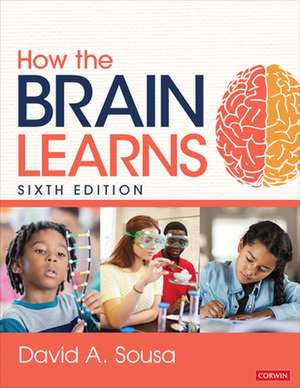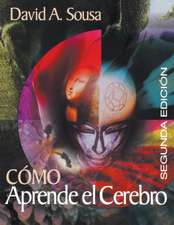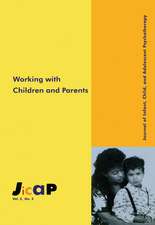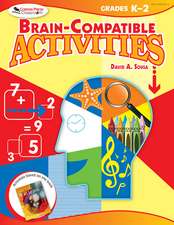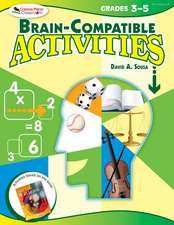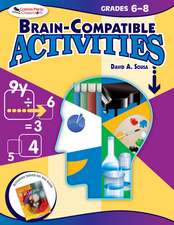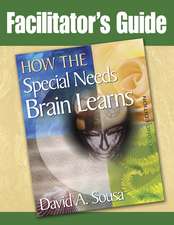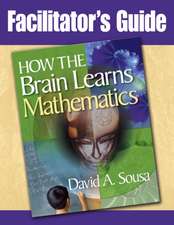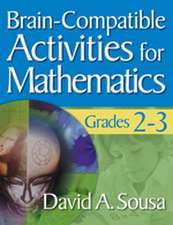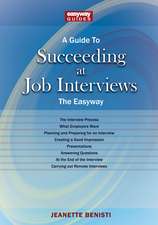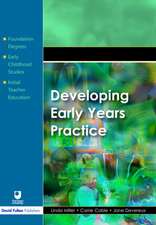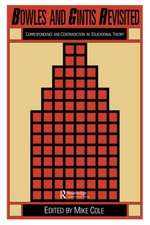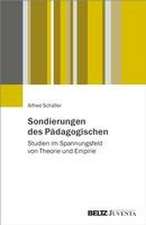How the Brain Learns
Autor David A. Sousaen Limba Engleză Paperback – 20 apr 2022
Preț: 252.51 lei
Nou
Puncte Express: 379
Preț estimativ în valută:
48.32€ • 50.58$ • 39.98£
48.32€ • 50.58$ • 39.98£
Carte disponibilă
Livrare economică 15-29 martie
Livrare express 01-07 martie pentru 143.17 lei
Preluare comenzi: 021 569.72.76
Specificații
ISBN-13: 9781071855362
ISBN-10: 1071855360
Pagini: 336
Dimensiuni: 216 x 279 x 25 mm
Greutate: 0.93 kg
Ediția:Sixth Edition
Editura: SAGE Publications
Colecția Corwin
Locul publicării:Thousand Oaks, United States
ISBN-10: 1071855360
Pagini: 336
Dimensiuni: 216 x 279 x 25 mm
Greutate: 0.93 kg
Ediția:Sixth Edition
Editura: SAGE Publications
Colecția Corwin
Locul publicării:Thousand Oaks, United States
Cuprins
Chapter 1: Basic Brain Facts
Chapter 2: How the Brain Processes Information
Chapter 3: Memory, Retention, and Learning
Chapter 4: The Power of Transfer
Chapter 5: Brain Organization and Learning
Chapter 6: Learning to Read and Learning Mathematics
Chapter 7: The Brain and the Arts
Chapter 8: Thinking Skills and Learning
Chapter 9: Putting It All Together
References
Glossary
Chapter 2: How the Brain Processes Information
Chapter 3: Memory, Retention, and Learning
Chapter 4: The Power of Transfer
Chapter 5: Brain Organization and Learning
Chapter 6: Learning to Read and Learning Mathematics
Chapter 7: The Brain and the Arts
Chapter 8: Thinking Skills and Learning
Chapter 9: Putting It All Together
References
Glossary
Notă biografică
Dr. David A. Sousa is an international consultant in educational neuroscience and author of more than twenty books that suggest ways educators and parents can translate current brain research into strategies for improving learning. A member of the Cognitive Neuroscience Society, he has conducted workshops in hundreds of school districts on brain research, instructional skills, and science education at the preK¿12 and university levels. He has made presentations to more than two hundred thousand educators at national conventions of educational organizations and to regional and local school districts across the United States, Canada, Europe, Australia, New Zealand, and Asia.
Dr. Sousa has a bachelor¿s degree in chemistry from Bridgewater State University in Massachusetts, a master of arts in teaching degree in science from Harvard University, and a doctorate from Rutgers University. His teaching experience covers all levels. He has taught senior high school science and served as a K¿12 director of science, supervisor of instruction, and district superintendent in New Jersey schools. He was an adjunct professor of education at Seton Hall University for ten years and a visiting lecturer at Rutgers University.
Prior to his career in New Jersey, Dr. Sousa taught at the American School of Paris (France) and served for five years as a foreign service officer and science advisor at the US diplomatic missions in Geneva (Switzerland) and Vienna (Austria).
Dr. Sousa has edited science books and published dozens of articles in leading journals on professional development, science education, and educational research. His most popular books for educators include How the Brain Learns, now in its sixth edition; How the Special Needs Brain Learns, second edition; How the Gifted Brain Learns; How the Brain Learns to Read, second edition; How the Brain Influences Behavior; How the ELL Brain Learns; Differentiation and the Brain, second edition, (with Carol Tomlinson); and How the Brain Learns Mathematics, second edition, which was selected by the Independent Book Publishers¿ Association as one of the best professional-development books. The Leadership Brain suggests ways for educators to lead today¿s schools more effectively. His books have been published in French, Spanish, Chinese, Arabic, Korean, Russian, and several other languages. His book Brainwork: The Neuroscience Behind How We Lead Others is written for business and organizational leaders.
Dr. Sousa is past president of the National Staff Development Council (now called Learning Forward). He has received numerous awards from professional associations, school districts, and educational foundations for his commitment to research, staff development, and science education. He received the Distinguished Alumni Award and an honorary doctorate from Bridgewater State University and an honorary doctorate in humane letters from Gratz College in Philadelphia.
Dr. Sousa has been interviewed on the NBC Today show, by other television programs, and by National Public Radio about his work with schools using brain research. He makes his home in south Florida.
Dr. Sousa has a bachelor¿s degree in chemistry from Bridgewater State University in Massachusetts, a master of arts in teaching degree in science from Harvard University, and a doctorate from Rutgers University. His teaching experience covers all levels. He has taught senior high school science and served as a K¿12 director of science, supervisor of instruction, and district superintendent in New Jersey schools. He was an adjunct professor of education at Seton Hall University for ten years and a visiting lecturer at Rutgers University.
Prior to his career in New Jersey, Dr. Sousa taught at the American School of Paris (France) and served for five years as a foreign service officer and science advisor at the US diplomatic missions in Geneva (Switzerland) and Vienna (Austria).
Dr. Sousa has edited science books and published dozens of articles in leading journals on professional development, science education, and educational research. His most popular books for educators include How the Brain Learns, now in its sixth edition; How the Special Needs Brain Learns, second edition; How the Gifted Brain Learns; How the Brain Learns to Read, second edition; How the Brain Influences Behavior; How the ELL Brain Learns; Differentiation and the Brain, second edition, (with Carol Tomlinson); and How the Brain Learns Mathematics, second edition, which was selected by the Independent Book Publishers¿ Association as one of the best professional-development books. The Leadership Brain suggests ways for educators to lead today¿s schools more effectively. His books have been published in French, Spanish, Chinese, Arabic, Korean, Russian, and several other languages. His book Brainwork: The Neuroscience Behind How We Lead Others is written for business and organizational leaders.
Dr. Sousa is past president of the National Staff Development Council (now called Learning Forward). He has received numerous awards from professional associations, school districts, and educational foundations for his commitment to research, staff development, and science education. He received the Distinguished Alumni Award and an honorary doctorate from Bridgewater State University and an honorary doctorate in humane letters from Gratz College in Philadelphia.
Dr. Sousa has been interviewed on the NBC Today show, by other television programs, and by National Public Radio about his work with schools using brain research. He makes his home in south Florida.
Descriere
Deliver game-changing—and brain-changing—results for your students
Research on the brain continues to evolve, providing fresh insights educators can use to guide students toward success. In the sixth edition of this international bestseller, world-renowned educational neuroscience consultant David Sousa once again translates that research into concrete actions and strategies for the classroom.
Featuring important updates and brand-new findings, the latest edition includes:
Research on the brain continues to evolve, providing fresh insights educators can use to guide students toward success. In the sixth edition of this international bestseller, world-renowned educational neuroscience consultant David Sousa once again translates that research into concrete actions and strategies for the classroom.
Featuring important updates and brand-new findings, the latest edition includes:
- A new section on the expansion of SEL to SECL, integrating the cognitive component of social-emotional learning
- Additional research on mindsets—including cautions
- Effective, brain-compatible ways to safely use social media and online learning
- New information on the importance of student engagement, especially through academic teams
- Connections between Bloom’s Taxonomy and current instructional strategies, such as teaming and project/maker learning
